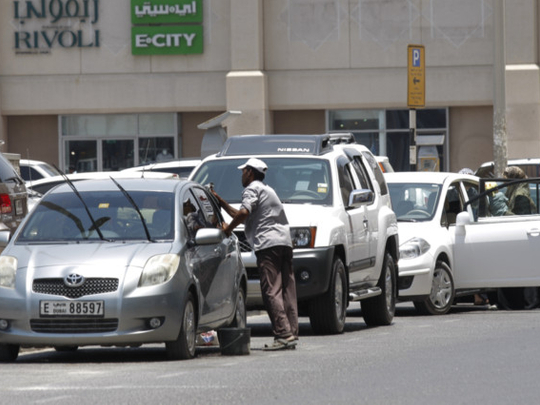
Sharjah: The Municipal Council of the City of Sharjah has proposed a plan to regulate car washing on the streets of Sharjah in a meeting held on Tuesday.
Led by Engineer Ahmad Omran Taryam, vice president of the Municipal Council of the city of Sharjah, the meeting discussed the move to limit car washing to mall parking, petrol stations and car cleaning service shops, which should have a license issued by the council in order to offer the service. If approved, the move will also allow car washing in private parking spaces of government organisations who want to carry out the service within their facility.
Laws banning car washing in open, public spaces and main streets will also be strictly enforced by the Municipality who will issue violators a fine of Dh250. The fine will be given to residents who pay people who are not affiliated with an authorised company to clean their vehicles.
Highlighting the importance of water preservation, the council also urged shops who offer the service of car washing to use modern devices in order to minimise water wastage.
A fine of Dh500 will be issued to residents who cause a great deal of water to be accumulated on streets either by washing their vehicles in the driveway or negligently leaving their water hose running.
Preventing water spillage
Also aiming to prevent illegal car wash services, the Sharjah Municipality had launched a campaign last June to prevent the spillage of water on streets, especially in Sharjah’s residential areas.
The move, however, was not taken too well by many unlicensed car washers in Sharjah.
Gulf News talked to an unlicensed Bangladeshi car washer, who said some of his countrymen wash up to 20 cars a month. With going rates at Dh100 per car per month, that amounts to Dh2,000.
“I’m a cleaner in a building in Al Majaz. I only make about Dh500 per month. But I can make thousands of dirhams from washing cars after my day shift ends,” he said, declining to be named.
“If the government inspectors catch us, they slap a Dh250 fine on our Emirates ID card. I can afford that because the money is good from car washing. I’m careful only to wash late at night.”
To avoid suspicion, he said many car washers no longer put up the windscreen wipers after they wash a car, which is the usual way to let car owners know their vehicle was washed during the night.
Cat-and-mouse game
“We tend to keep the wipers down now in areas where the inspectors are active. It’s a cat-and-mouse game between us and them, but when you’re poor, you’re not afraid to take risks to make extra money,” he added.
Another washer, a Pakistani building watchman in Al Khan, said on condition of anonymity that he decides who washes tenants’ cars.
“I control who gets to wash cars of my tenants, you have to keep their numbers down to maintain price. I too wash cars — about four or five of them — for Dh65 a month per vehicle,” he said.
“I’ve got four children back home, I’m only paid about Dh1,000 a month. Washing cars is a way of making more money,” the Pakistani worker added.
“If the landlord and tenants don’t object, it shouldn’t be illegal. Most of the washing is done in sandy or gravel lots, so the earth soaks up the water and there’s no mess left.”
An Indian car owner, who did not want to be named, said he pays about Dh7 to have his vehicle washed per session. “Compare that with Dh35 or even Dh50 per wash at official venues, depending on where you go. I don’t have the time or energy to face traffic and wait in line by going to a car wash — I’ve got my own personal car washer in my building’s parking,” the motorist said.
“When I go to work in the morning, my car’s already cleaned. It’s about convenience and being cost-effective. I don’t think the water and detergents they use are too much or environmentally bad. In fact, car washes use more water and soap,” he added.












